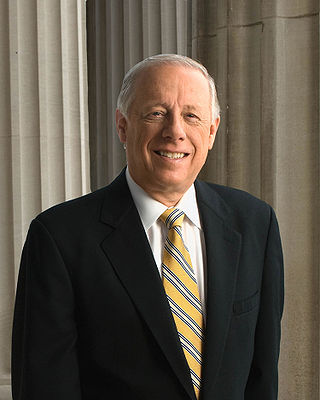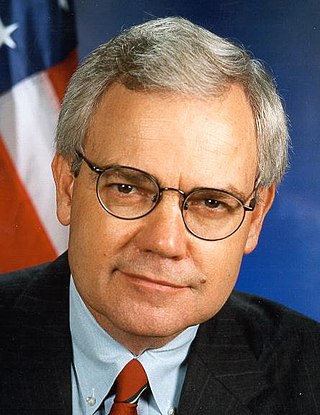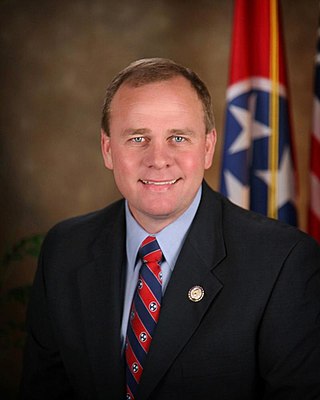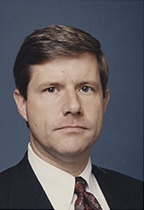
Edward Glenn Bryant is an American politician who is a former Republican member of the United States House of Representatives from Tennessee (1995–2003). From 1991–1993, he served as the United States Attorney for the Western District of Tennessee. On December 12, 2008, Bryant was sworn in as a United States magistrate judge for the Western District of Tennessee. He retired from this position on February 28, 2019.

Lincoln Edward Davis is an American politician and the former U.S. Representative for Tennessee's 4th congressional district. He is a member of the Democratic Party. He is a member of the ReFormers Caucus of Issue One.

Philip Norman Bredesen Jr. is an American politician and businessman who served as the 48th governor of Tennessee from 2003 to 2011. A member of the Democratic Party, he was elected in 2002 with 50.6% of the vote and re-elected in 2006 with 68.6%. He is the most recent Democrat elected to a statewide office in the state. He served as the 66th mayor of Nashville from 1991 to 1999. Bredesen is the founder of the HealthAmerica Corporation, which he sold in 1986.

Donald Kenneth Sundquist was an American businessman and politician who served as the 47th governor of Tennessee from 1995 to 2003. Prior to his governorship, he represented Tennessee's 7th congressional district in the United States House of Representatives from 1983 to 1995. He was a member of the Republican Party.

James Hayes Shofner Cooper is an American lawyer, businessman, professor, and politician who served as the U.S. representative for Tennessee's 5th congressional district from 2003 to 2023. He is a member of the Democratic Party and was a member of the Blue Dog Coalition, and represented Tennessee's 4th congressional district from 1983 to 1995. His district included all of Nashville. He chaired the United States House Armed Services Subcommittee on Strategic Forces of the House Armed Services Committee, and sat on the Committee on Oversight and Reform, United States House Committee on the Budget, and the House Permanent Select Committee on Intelligence, more committees than any other member of Congress. At the end of his tenure, he was also the dean of Tennessee's congressional delegation. Cooper is the third-longest serving member of Congress ever from Tennessee, after Jimmy Quillen and B. Carroll Reece.

Robert Nelson Clement is an American politician and academic administrator. He is a member of the Democratic Party and served in the United States House of Representatives, representing Tennessee, from 1988 until 2003, when he retired to run unsuccessfully for the United States Senate.

The 2006 United States Senate election in Tennessee was held on November 7, 2006. Incumbent Republican Senator Bill Frist, the Majority Leader, retired after two terms in office. The open seat was won by Republican nominee Bob Corker, who defeated Democratic nominee Harold Ford Jr.
James M. Henry was minority leader in the Tennessee House of Representatives from 1981 to 1986, and a 2002 candidate for the Republican Party nomination for governor of Tennessee, losing the primary election to U.S. Representative Van Hilleary, who in turn lost the subsequent general election to Tennessee governor Phil Bredesen. Henry has previously served as President and CEO of Omni Visions, Inc, first commissioner of the Tennessee Department of Intellectual and Developmental Disabilities, and commissioner of the Tennessee Department of Children's Services. Henry served as deputy to the governor and chief of staff to Bill Haslam.
The 4th congressional district of Tennessee is a congressional district in southern Tennessee. It has been represented by Republican Scott DesJarlais since January 2011.
The 7th congressional district of Tennessee is a congressional district located in parts of Middle and West Tennessee. It has been represented by Republican Mark E. Green since January 2019. The seventh district has significant suburban and rural areas. Although most of the area is rural, more than half of the district's vote is cast in either Montgomery County (Clarksville) or Williamson County.

The 2006 congressional elections in Tennessee was held on November 7, 2006, to determine who will represent the state of Tennessee in the United States House of Representatives.

Stephen Lee Fincher is an American politician who was the U.S. representative for Tennessee's 8th congressional district from 2011 to 2017. He is a member of the Republican Party. The seat was vacated by retiring Democratic incumbent John S. Tanner in 2010, and Fincher defeated Democratic Tennessee state senator Roy Herron in the 2010 mid-term Congressional election. Fincher was reelected in 2012 and 2014. On February 1, 2016, he announced that he would not be running for a fourth term. On October 22, 2017, Fincher announced his candidacy for the U.S Senate seat held by outgoing Senator Bob Corker. Fincher withdrew his candidacy in February 2018, instead urging Corker to seek reelection.

The 2012 United States Senate election in Tennessee took place on November 6, 2012, as part of the general election including the 2012 U.S. presidential election, elections to the House of Representatives and various state and local elections. Incumbent Republican U.S. Senator Bob Corker won a second term in a landslide, carrying all but two counties in the state.

Harold Eugene Ford Jr. is an American financial managing director, pundit, author, and former U.S. Congressman who served from 1997–2007 in the United States House of Representatives as a member of the Democratic Party from Tennessee's 9th congressional district, centered in Memphis. He is a member of the Ford political family from Memphis, and is the son of former Congressman Harold Ford Sr., who held the same seat for 22 years. In 2006, Ford made an unsuccessful bid for the U.S. Senate seat vacated by the retiring Bill Frist. He was also the last chairman of the Democratic Leadership Council (DLC).

The 2014 United States Senate election in Tennessee took place on November 4, 2014, to elect a member of the United States Senate from the State of Tennessee. Incumbent Republican U.S. Senator Lamar Alexander defeated Democrat Gordon Ball, and was re-elected to a third term in office with 61.9% of the vote against 31.9%.

The 2002 Tennessee gubernatorial election took place on November 5, 2002, to elect the next governor of Tennessee. The incumbent, Don Sundquist, was term-limited and is prohibited by the Constitution of Tennessee from seeking a third consecutive term. To succeed him, former Nashville Mayor Phil Bredesen, the Democratic nominee, who had run against Sundquist in 1994, narrowly defeated United States Congressman Van Hilleary, the Republican nominee, in the general election.

The 2018 United States Senate election in Tennessee took place on November 6, 2018, concurrently with other elections to the United States Senate, elections to the United States House of Representatives and various state and local elections. Incumbent Republican Senator Bob Corker opted to retire instead of running for a third term. Republican U.S. Representative Marsha Blackburn won the open seat, defeating former Democratic Governor Phil Bredesen.

The 2018 United States House of Representatives elections in Tennessee was held on November 6, 2018, to elect the nine U.S. representatives from the state of Tennessee, one from each of the state's nine congressional districts. The elections coincided with the elections of other federal and state offices, including the gubernatorial election.
The 2022 United States House of Representatives elections in Tennessee was held on November 8, 2022, to elect the nine U.S. representatives from the state of Tennessee, one from each of the state's nine congressional districts. The elections coincided with other elections to the House of Representatives, elections to the United States Senate, and various state and local elections.

Tennessee state elections in 2018 were held on Tuesday, November 6, 2018. Primary elections for the United States Senate, United States House of Representatives, governorship, Tennessee Senate, and Tennessee House of Representatives, were held on August 2, 2018.









